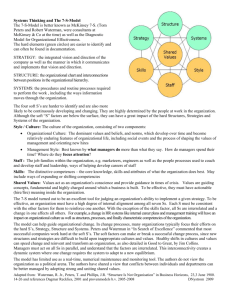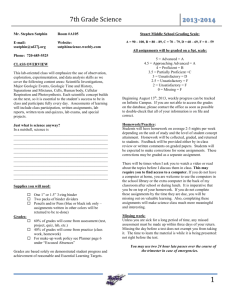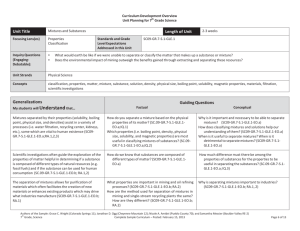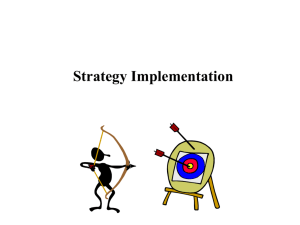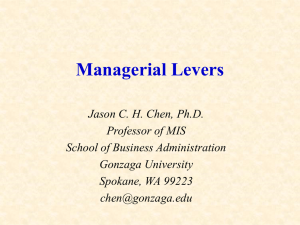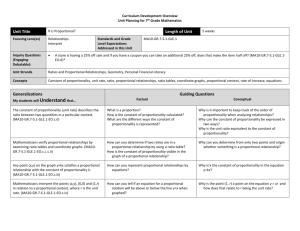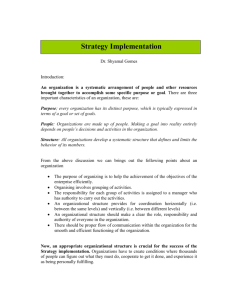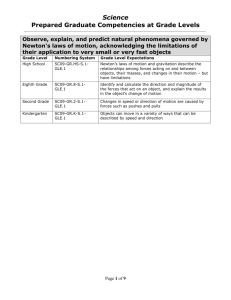Word
advertisement
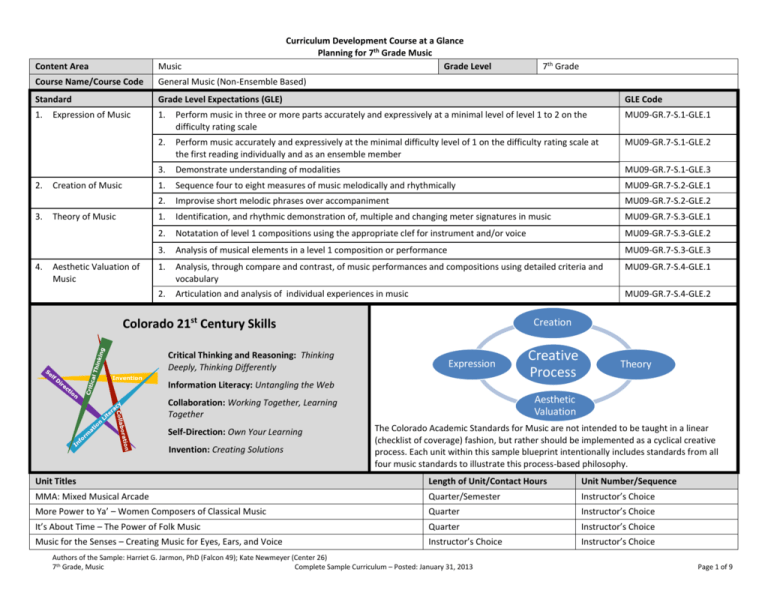
Curriculum Development Course at a Glance Planning for 7th Grade Music Grade Level 7th Grade Content Area Music Course Name/Course Code General Music (Non-Ensemble Based) Standard Grade Level Expectations (GLE) GLE Code 1. 1. Perform music in three or more parts accurately and expressively at a minimal level of level 1 to 2 on the difficulty rating scale MU09-GR.7-S.1-GLE.1 2. Perform music accurately and expressively at the minimal difficulty level of 1 on the difficulty rating scale at the first reading individually and as an ensemble member MU09-GR.7-S.1-GLE.2 3. Demonstrate understanding of modalities MU09-GR.7-S.1-GLE.3 1. Sequence four to eight measures of music melodically and rhythmically MU09-GR.7-S.2-GLE.1 2. Improvise short melodic phrases over accompaniment MU09-GR.7-S.2-GLE.2 1. Identification, and rhythmic demonstration of, multiple and changing meter signatures in music MU09-GR.7-S.3-GLE.1 2. Notatation of level 1 compositions using the appropriate clef for instrument and/or voice MU09-GR.7-S.3-GLE.2 3. Analysis of musical elements in a level 1 composition or performance MU09-GR.7-S.3-GLE.3 1. Analysis, through compare and contrast, of music performances and compositions using detailed criteria and vocabulary MU09-GR.7-S.4-GLE.1 2. Articulation and analysis of individual experiences in music MU09-GR.7-S.4-GLE.2 2. 3. 4. Expression of Music Creation of Music Theory of Music Aesthetic Valuation of Music Colorado 21st Century Skills Critical Thinking and Reasoning: Thinking Deeply, Thinking Differently Invention Creation Expression Creative Process Theory Information Literacy: Untangling the Web Aesthetic Valuation Collaboration: Working Together, Learning Together Self-Direction: Own Your Learning Invention: Creating Solutions The Colorado Academic Standards for Music are not intended to be taught in a linear (checklist of coverage) fashion, but rather should be implemented as a cyclical creative process. Each unit within this sample blueprint intentionally includes standards from all four music standards to illustrate this process-based philosophy. Unit Titles Length of Unit/Contact Hours Unit Number/Sequence MMA: Mixed Musical Arcade Quarter/Semester Instructor’s Choice More Power to Ya’ – Women Composers of Classical Music Quarter Instructor’s Choice It’s About Time – The Power of Folk Music Quarter Instructor’s Choice Music for the Senses – Creating Music for Eyes, Ears, and Voice Instructor’s Choice Instructor’s Choice Authors of the Sample: Harriet G. Jarmon, PhD (Falcon 49); Kate Newmeyer (Center 26) 7th Grade, Music Complete Sample Curriculum – Posted: January 31, 2013 Page 1 of 9 Curriculum Development Overview Unit Planning for 7th Grade Music Unit Title MMA: Mixed Musical Arcade Focusing Lens(es) Innovation Play/Exploration Inquiry Questions (EngagingDebatable): Unit Strands Expression, Creation, Theory, Aesthetic Valuation Concepts Composition, Technique, Emotion, Influence, Value, Order/Form, Creativity Length of Unit Standards and Grade Level Expectations Addressed in this Unit Quarter/Semester MU09-GR.7-S.1-GLE.1, MU09-GR.7-S.1-GLE.2 MU09-GR.7-S.2-GLE.1, MU09-GR.7-S.2-GLE.2 MU09-GR.7-S.3-GLE.1, MU09-GR.7-S.3-GLE.2, MU09-GR.7-S.3-GLE.3 MU09-GR.7-S.4-GLE.1, MU09-GR.7-S.4-GLE.2 How have the developments of electronic devices shaped the way we create music? (MU09-GR.7-S.1-GLE.1) and (MU09-GR.7-S.2-GLE.1,2) and (MU09GR.7-S.4-GLE.1,2) What role has innovation played in the transformation of music? Does electronically created music compromise the beliefs and values of a musician? Is there order and form as well as play and exploration in electronic compositions? Generalizations My students will Understand that… Guiding Questions Factual Conceptual Electronic music technique and innovations expands possibilities for musical composition. (MU09-GR.7-S.1GLE.1,2,3) and (MU09-GR.7-S.3-GLE.2,3) and (MU09-GR.7S.4-GLE.1,2) What are some common Apps or computer programs that can be used to create music compositions? What are some common Apps or computer programs that can teach you to play an instrument or how to sing? How has technology affected the way music is composed? In what ways has technology made composing music easier? Music compositions added to other media (e.g. video games, movies, commercials) enhance the overall experience of the audience. (MU09-GR.7-S.1-GLE.1,3) and (MU09-GR.7-S.2-GLE.1) and (MU09-GR.7-S.3-GLE.1,2,3) and (MU09-GR.7-S.4-GLE.1,2) What are current media (e.g. video games, movies commercials) that incorporate musical melodies? What elements of music can be used to accompany the graphics in media (e.g. video games, movies, commercials)? How is music used to create interest, curiosity and excitement in media (e.g. video games, movies, commercials)? Compositions designed for particular media (e.g. video games, movies, commercials) demonstrate order and form through musical creativity. (MU09-GR.7-S.1-GLE.1) and (MU09-GR.7-S.2-GLE.1) and (MU09-GR.7-S.3GLE.1,2,3) and (MU09-GR.7-S.4-GLE.1,2) How would one compare and contrast the musical form of theme for a video game, commercial, or movie to a short classical composition? How does rhythmic timing in a video game, commercial, or movie compare to the meter in a short classical composition? What are the musical elements found in video games, commercials, or movies? How are musical elements used to capture the playfulness in media (e.g. video games, commercials, movies)? Authors of the Sample: Harriet G. Jarmon, PhD (Falcon 49) 7th Grade, Music Complete Sample Curriculum – Posted: January 31, 2013 Page 2 of 9 Curriculum Development Overview Unit Planning for 7th Grade Music Critical Content: Key Skills: My students will Know… My students will be able to (Do)… Technology has changed the way music is written and produced. (MU09-GR.7-S.4GLE.1,2) Music is an integral part of the experience of video games, movies and commercials. (MU09-GR.7-S.4-GLE.1,2) Music designed for video games, movies, commercials, and other media requires innovation, playfulness and exploration (MU09-GR.7-S.4-GLE.1,2) Perform music from an electronic media (MU09-GR.7-S.1-GLE.1) Create music using electronic media and publish their works on the Internet. (MU09-GR.7-S.2-GLE.1) Transcribe, notate, and analyze music from electronic media (MU09-GR.7-S.3GLE.1,2,3) Critical Language: includes the Academic and Technical vocabulary, semantics, and discourse which are particular to and necessary for accessing a given discipline. EXAMPLE: A student in Language Arts can demonstrate the ability to apply and comprehend critical language through the following statement: “Mark Twain exposes the hypocrisy of slavery through the use of satire.” A student in ______________ can demonstrate the ability to apply and comprehend critical language through the following statement(s): Computer generated music contains form and structure as well as creativity and improvisation, and is integral to the experience of 21st century media. Academic Vocabulary: Play, design, exploration, 21st century, influence, virtual, computer generated, structure, creativity, analyze, media Technical Vocabulary: Form, improvisation, transcribe, notate Authors of the Sample: Harriet G. Jarmon, PhD (Falcon 49) 7th Grade, Music Complete Sample Curriculum – Posted: January 31, 2013 Page 3 of 9 Curriculum Development Overview Unit Planning for 7th Grade Music Unit Title More Power to Ya – Less Recognized Composers of Classical Music* *This example features women composers, but the ideas from the unite could be applied to any less recognized group – e.g. minorities, differently abled, religious minorities, or others Focusing Lens(es) Influence, Inspiration Inquiry Questions (EngagingDebatable): Unit Strands Expression, Creation, Theory, Aesthetic Valuation Concepts Composition, Culture, Tradition, Influence, Change, Society Standards and Grade Level Expectations Addressed in this Unit Length of Unit Quarter MU09-GR.7-S.1-GLE.1, MU09-GR.7-S.1-GLE.2 MU09-GR.7-S.2-GLE.1, MU09-GR.7-S.2-GLE.2 MU09-GR.7-S.3-GLE.1, MU09-GR.7-S.3-GLE.2, MU09-GR.7-S.3-GLE.3 MU09-GR.7-S.4-GLE.1, MU09-GR.7-S.4-GLE.2 How have women composers been hindered or encouraged in the timeline of music history? (MU09-GR.7-vS.1-GLE.1) and (MU09-GR.7-S.4-GLE.2) What advances have women composers made throughout music history? Do women composers have their own identity in the music industry? What contributions have women composers made in the 21st century? Generalizations My students will Understand that… Guiding Questions Factual Conceptual The influence of women expanded musical traditions in composition. (MU09-GR.7-S.1-GLE.1; MU09-GR.7-S.2GLE.1) and (MU09-GR.7-S.3-GLE.1,3) and (MU09-GR.7-S.4GLE.1,2) How were the contributions of women in music viewed from the classical era/romantic era/modern era? Is the music of women composers relevant? Why or why not? How do women composers view their musical compositions? Societal change facilitates women composers’ influence on music publication. (MU09-GR.7-S.1-GLE.1) and (MU09GR.7-S.2-GLE.1) and (MU09-GR.7-S.3-GLE.1,3) and (MU09GR.7-S.4-GLE.1,2) Why were women discriminated against in the music industry? What type of jobs did women composers take during the classical period (or other time period)? What are some of the setbacks women composers faced in the classical period (or other time period)? How have women composers overcome challenges? Compositions of women composers demonstrate changes in tradition. (MU09-GR.7-S.1-GLE 1; MU09-GR.7-S.2GLE.1) and ( MU09-GR.7-S.3-GLE.3) and (MU09-GR.7-S.4GLE.1,2) Who are some living women composers? What are compositional styles of the 21st century? Why is the recognition of women composers important to music? How are women composers challenged in the 21st century? Authors of the Sample: Harriet G. Jarmon, PhD (Falcon 49) 7th Grade, Music Complete Sample Curriculum – Posted: January 31, 2013 Page 4 of 9 Curriculum Development Overview Unit Planning for 7th Grade Music Critical Content: Key Skills: My students will Know… My students will be able to (Do)… The names of several women composers from the classical, romantic, and modern eras (MU09-GR.7-S.1-GLE.1) and (MU09-GR.7-S.4-GLE.1,2) Ways that contributions of women composers have evolved throughout music history. (MU09-GR.7-S.1-GLE.1) and (MU09-GR.7-S.4-GLE.1,2) How contributions of women have aided in music production and composition (MU09-GR.7-S.4-GLE.2) Perform music composed by women from different historical time periods and in different keys and modalities (MU09-GR.7-S.1-GLE.1,3) and (MU09-GR.7-S.3GLE.1,3) and (MU09-GR.7-S.4-GLE.1,2) Create an 8 measure phrase of music in the style of a woman composer (MU09GR.7-S.2-GLE.1) and (MU09-GR.7-S.3-GLE.1,2,3 Identify rhythms in music by women composers (MU09-GR.7-S.1-GLE.1) and (MU09-GR.7-S.3-GLE.1) Analyze music written by women composers (MU09-GR.7-S.1-GLE.1) and (MU09GR.7-S.3-GLE.2) Evaluate music written by women composers (MU09-GR.7-S.1-GLE.1) and (MU09GR.7-S.4-GLE.1) Critical Language: includes the Academic and Technical vocabulary, semantics, and discourse which are particular to and necessary for accessing a given discipline. EXAMPLE: A student in Language Arts can demonstrate the ability to apply and comprehend critical language through the following statement: “Mark Twain exposes the hypocrisy of slavery through the use of satire.” A student in ______________ can demonstrate the ability to apply and comprehend critical language through the following statement(s): The contributions of women to the field of composition have demonstrated the continued evolution of the music industry. Academic Vocabulary: Identity, century, movement, challenges, economics, industry, contribution, evolution Technical Vocabulary: Composition, genre, performance Authors of the Sample: Harriet G. Jarmon, PhD (Falcon 49) 7th Grade, Music Complete Sample Curriculum – Posted: January 31, 2013 Page 5 of 9 Curriculum Development Overview Unit Planning for 7th Grade Music Unit Title It’s About Time – The Power of Folk Music Focusing Lens(es) Influence, Tension/Conflict Inquiry Questions (EngagingDebatable): Unit Strands Expression, Creation, Theory, Aesthetic Valuation Concepts Influence, Style, Expressions, Culture, Composition, Tradition, Change, Representation, Era, Preservation Standards and Grade Level Expectations Addressed in this Unit Length of Unit Quarter MU09-GR.7-S.1-GLE.1, MU09-GR.7-S.1-GLE.2, MU09-GR.7-S.1-GLE.3 MU09-GR.7-S.2-GLE.1, MU09-GR.7-S.2-GLE.2 MU09-GR.7-S.3-GLE.1, MU09-GR.7-S.3-GLE.3 MU09-GR.7-S.4-GLE.1, MU09-GR.7-S.4-GLE.2 In what ways did American folk music impact societal views on politics and social issues? (MU09-GR.7-S.1-GLE.1) and (MU09-GR.7-S.2-GLE.2) and (MU09-GR.7-S.3-GLE.1,3) and (MU09-GR.7-S.4-GLE.2) How did the American folk music polarize communities? What inspired musicians to create folk music? What ideas influenced composers of folk music? Generalizations My students will Understand that… Guiding Questions Factual Conceptual Some historical and cultural events inspire musical compositions. (MU09-GR.7-S.1-GLE.1,2) and (MU09-GR.7S.3-GLE.3) and (MU09-GR.7-S.4-GLE.1,2) What events created work songs? What is a historical timeline for folk music? What songs do you know that are influenced by historical or current events? How did work songs influence society? How do events cause musicians to compose in a particular style? Folk music compositions utilize expressions of circumstance to influence change. (MU09-GR.7-S.1GLE.1,2,3; MU09-GR.7-S.2-GLE.1,2) and (MU09-GR.7-S.3GLE.1,3) and (MU09-GR.7-S.4-GLE.1,2) What are some examples of composers using music to influence change? What is folk music? From which causes or issues have composers used music to raise awareness of issues? Should composers use music to influence change? Why do musicians use music as an effective medium to comment on social issues? How have folk music composers used irony in their compositions? Folk music styles preserve cultural traditions by allowing performers and listeners to remember a different time. (MU09-GR.7-S.1-GLE.1,3) and (MU09-GR.7-S.2-GLE.1) and (MU09-GR.7- S.3-GLE.3) and (MU09-GR.7-S.4-GLE.1,2) In what ways do folk songs preserve culture? Who are modern folk music composers and performers? How is Hip-Hop music similar to folk music? How have folk music traditions been adopted in the modern era? Authors of the Sample: Harriet G. Jarmon, PhD (Falcon 49); Kate Newmeyer (Center 26) 7th Grade, Music Complete Sample Curriculum – Posted: January 31, 2013 Page 6 of 9 Curriculum Development Overview Unit Planning for 7th Grade Music Critical Content: Key Skills: My students will Know… My students will be able to (Do)… Folk music often preserves life-changing events in history (MU09-GR.7-S.1-GLE.1,3) and (MU09-GR.7-S.3-GLE.3) and (MU09-GR.7-S.4-GLE.1,2) Historical events that triggered composition of folk music (MU09-GR.7-S.1-GLE.1) and (MU09-GR.7-S.4-GLE.1,2) Folk music has served as a medium for public outcry (MU09-GR.7-S.1-GLE.1) and (MU09-GR.7-S.3-GLE.3) and (MU09-GR.7-S.4-GLE.1,2) Composers use folk music to express their values and beliefs (MU09-GR.7-S.1GLE.1) and (MU09-GR.7-S.3-GLE.3) and (MU09-GR.7-S.4-GLE.1,2) Perform folk music accurately and expressively (MU09-GR.7-S.1-GLE.1,3) Sight read melodies of folk music (MU09-GR.7-S.1-GLE.2,3) Create a folk melody based on ideas discussed in class (MU09-GR.7-S.2-GLE.1) and ( MU09-GR.7-S.3-GLE.1,2,3) Improvise new verses to traditional folk music (MU09-GR.7-S.2-GLE.2) Transcribe a melody from traditional folk music (MU09-GR.7-S.3-GLE.1,2,3) Critical Language: includes the Academic and Technical vocabulary, semantics, and discourse which are particular to and necessary for accessing a given discipline. EXAMPLE: A student in Language Arts can demonstrate the ability to apply and comprehend critical language through the following statement: “Mark Twain exposes the hypocrisy of slavery through the use of satire.” A student in ______________ can demonstrate the ability to apply and comprehend critical language through the following statement(s): Composers have used the folk music as an avenue to change public opinion, sway public policy, and to preserve historical events. Academic Vocabulary: Public, conflict, values, beliefs, humor, expression, political, tension, influence, emotions Technical Vocabulary: Folk music, composers, lyrics Authors of the Sample: Harriet G. Jarmon, PhD (Falcon 49); Kate Newmeyer (Center 26) 7th Grade, Music Complete Sample Curriculum – Posted: January 31, 2013 Page 7 of 9 Curriculum Development Overview Unit Planning for 7th Grade Music Unit Title Music for the Senses Focusing Lens(es) Play/Exploration, Inspiration Inquiry Questions (EngagingDebatable): Unit Strands Expression, Creation, Theory, Aesthetic Valuation Concepts Composition, Elements of Music (rhythm, pitch, form, dynamics, tempo, timbre) Technique, Expressions, Improvisation, Imagery, Language, Notation Length of Unit Standards and Grade Level Expectations Addressed in this Unit Instructor Choice MU09-GR.7-S.1-GLE.1, MU09-GR.7-S.1-GLE.2, MU09-GR.7-S.1-GLE.3 MU09-GR.7-S.2-GLE.1, MU09-GR.7-S.2-GLE.2 MU09-GR.7-S.3-GLE.1, MU09-GR.7-S.3-GLE.2, MU09-GR.7-S.3-GLE.3 MU09-GR.7-S.4-GLE.1, MU09-GR.7-S.4-GLE.2 How do composers imagine and create compositions? (MU09-GR.7-S.2-GLE.1) and (MU09-GR.7-S.3-GLE.1,2,3) and (MU09-GR.7-S.4-GLE.1,2) How are notation systems the language of music?) How do elements of music (beat/meter, dynamics, melody, harmony, key, voice/timbre, etc) translate to visual images and written/spoken language? How can the ability to imagine and create a product have implications for a variety of other endeavors? Generalizations My students will Understand that… Guiding Questions Factual Conceptual Elements of music correspond to visual imagery and spoken/written language. (MU09-GR.7-S.3-GLE.1,2,3) and (MU09-GR.7-S.4-GLE.1,2) What are some/the elements of music? What examples of visual imagery and written/spoken language correspond to an element of music? How can we evaluate the elements of music for importance in a given piece? Composition and improvisations facilitates use of traditional and non-traditional notation. (MU09-GR.7-S.1GLE.1) and (MU09-GR.7-S.2-GLE.1,2) and (MU09-GR.7-S.3GLE.1,2,3) What are methods/processes by which composers can create music? What is music notation and how does it work? How does notation express music? What are criteria we can use to create our own system of music notation? Musical composition presents inspiration for visual or written expressions. (MU09-GR.7-S.1-GLE.1; MU09-GR.7S.2-GLE.1,2) and (MU09-GR.7-S.3-GLE.1,2 What are ways to create visual images through music? What are ways to create writing that will be expressive when spoken and translated to music? How can we access our memories, experiences, and emotions in response to music? How can we express our memories, experiences, and emotions in visual imagery and writing Technique informs creating and performing music from writing and visual images. (MU09-GR.7-S.1-GLE.1) and (MU09-GR.7-S.2-GLE.1) and (MU09-GR.7-S.3-GLE.1,2,3) What are skills we use to perform music? What are skills and processes we use to create visual images? What are skills we use to create effective writing and skills for effective oration? How are techniques of composition, performance, visual art-making, writing and speaking similar and different? Authors of the Sample: Kate Newmeyer (Center 26) 7th Grade, Music Complete Sample Curriculum – Posted: January 31, 2013 Page 8 of 9 Curriculum Development Overview Unit Planning for 7th Grade Music Critical Content: Key Skills: My students will Know… My students will be able to (Do)… Notation and how to write/create a notation system (MU09-GR.7-S.3-GLE.1,2,3) Techniques needed to perform on a variety of instruments/objects (MU09-GR.7S.1-GLE.1) Elements of music and how they correspond to the elements of visual art (MU09GR.7-S.3-GLE.1,2,3) Compose using either standard notation or another, or one of their own devising (MU09-GR.7-S.2-GLE.1) and (MU09-GR.7-S.3-GLE.1,2,3) Perform their composition using appropriate techniques for in the instruments/objects (MU09-GR.7-S.1-GLE.1) and (MU09-GR.7-S.2-GLE.1,2) and (MU09-GR.7-S.3-GLE.1,2,3) and (MU09-GR.7-S.4-GLE.1,2) Compose based on a visual image or writing (MU09-GR.7-S.2-GLE.2) and (MU09GR.7-S.3-GLE.1,2,3) Evaluate theirs and others’ compositions verbally in writing via personal narrative (MU09-GR.7-S.4-GLE.1,2) Critical Language: includes the Academic and Technical vocabulary, semantics, and discourse which are particular to and necessary for accessing a given discipline. EXAMPLE: A student in Language Arts can demonstrate the ability to apply and comprehend critical language through the following statement: “Mark Twain exposes the hypocrisy of slavery through the use of satire.” A student in ______________ can demonstrate the ability to apply and comprehend critical language through the following statement(s): Inspiration for musical composition can be derived from visual imagery and written or spoken language Academic Vocabulary: Narrative, reflection, visual, emotion, relevant, discovery, inspiration, influence, sentence, phrase, language Technical Vocabulary: Beat/meter, dynamics, melody, harmony, key, voice/timbre, rhythm, pattern, texture, composition Authors of the Sample: Kate Newmeyer (Center 26) 7th Grade, Music Complete Sample Curriculum – Posted: January 31, 2013 Page 9 of 9
